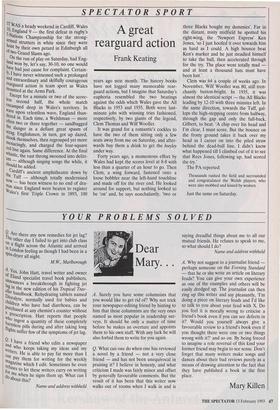SPECTATOR SPORT
A great rearguard action
Frank Keating
IT WAS a heady weekend in Cardiff. Wales 10, England 9 — the first defeat in rugby's 5-Nations Championship for the strong- !lined strutters in white since they were hoist by their own petard in Edinburgh all of two Grand Slams ago.
On the run of play on Saturday, had Eng- land won by, let's say, 30-10, no one would have had just cause for complaint. Certain
- I have never witnessed such a prolonged and extraordinary and skilfully courageous rearguard action in team sport as Wales Mounted at the Arms Park.
Except for a minute or two of the score- less second half, the whole match encamped deep in Wales's territory. In wave upon relentless wave, England thun- dered in. Each time, a Welshman — more often two or three together — sandbagged the danger in a defiant great spasm of set:a& Englishmen, in turn, got up dazed, snook themselves, then regrouped yet more Menacingly, and charged the four-square red line again. Same difference. At the final whistle, the vast throng swooned into deliri- um although singing songs the while, it should be added. Cardiff's ancient amphitheatre down by the Taff — although totally modernised now — has been witness to no end of dra- mas since England were beaten to register Wales's first Triple Crown in 1893, 100
years ago next month. The history books have not logged many memorable rear- guard actions, but I imagine that Saturday's euphoria resembled the two beatings against the odds which Wales gave the All Blacks in 1953 and 1935. Both were last- minute jobs with winning tries fashioned, respectively, by two giants of the legend, Clem Thomas and Wilf Wooller.
It was grand for a romantic's cockles to have the two of them sitting only a few seats away from me on Saturday, and after- wards buy them a drink to get the hwyley under way.
Forty years ago, a momentous effort by Wales had kept the scores level at 8-8 with less than a quarter of an hour to go. Then Clem, a wing forward, fastened onto a loose bobbler near the left-hand touchline and made off for the river end. He looked around for support, but nothing looked to be 'on' and, he says nonchalantly, 'two or
three Blacks bought my dummies'. Far in the distant, misty midfield he spotted his right-wing, the 'Newport Express' Ken Jones, 'so I just hoofed it over towards him as hard as I could. A high bounce beat Ken's marker and he just steadied himself to take the ball, then accelerated through for the try. The place went totally mad and at least a thousand hats must have been lost.'
Clem was 64 a couple of weeks ago. In November, Wilf Wooller was 80, still tren- chantly button-bright. In 1935, it was almost the identical script — the All Blacks leading by 12-10 with three minutes left. In the same direction, towards the Taff, gal- lops the high-stepping centre from halfway, through the gap and only the full-back, Gilbert, to beat. 'A chip over his head and I'm clear, I must score. But the bounce on the frosty ground takes it back over my head as I career on into the piled straw behind the dead-ball line. I didn't know what happened till I climbed out of it to see that Rees Jones, following up, had scored the try.'
The PA reported: Thousands rushed the field and surrounded and congratulated the Welsh players, who were also mobbed and kissed by women.
Just the same on Saturday.


















































 Previous page
Previous page